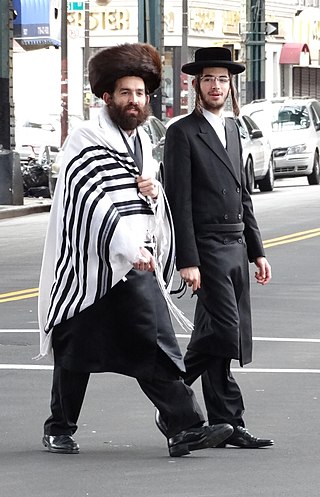Related Research Articles

Women in Judaism have affected the course of Judaism over millenia. Their role is reflected in the Hebrew Bible, the Oral Law, by custom, and by cultural factors. Although the Hebrew Bible and rabbinic literature present various female role models, religious law treats women in specific ways. According to a 2017 study by the Pew Research Center, women account for 52% of the worldwide Jewish population.

A bar mitzvah (masc.) or bat mitzvah (fem.) is a coming-of-age ritual in Judaism. According to Jewish law, before children reach a certain age, the parents are responsible for their child's actions. Once Jewish children reach that age, they are said to "become" b'nai mitzvah, at which point they begin to be held accountable for their own actions. Traditionally, the father of a bar or bat mitzvah offers thanks to God that he is no longer punished for his child's sins.

Haredi Judaism consists of groups within Orthodox Judaism that are characterized by their strict interpretation of religious sources and their accepted halakha and traditions, in opposition to more accommodating or modern values and practices. Its members are usually referred to as ultra-Orthodox in English; however, the term "ultra-Orthodox" is considered pejorative by many of its adherents, who prefer terms like strictly Orthodox or Haredi. Haredi Jews regard themselves as the most religiously authentic group of Jews, although other movements of Judaism disagree.

A tallit is a fringed garment worn as a prayer shawl by religious Jews. The tallit has special twined and knotted fringes known as tzitzit attached to its four corners. The cloth part is known as the beged ("garment") and is usually made from wool or cotton, although silk is sometimes used for a tallit gadol.

Tefillin, or phylacteries, are a set of small black leather boxes with leather straps containing scrolls of parchment inscribed with verses from the Torah. Tefillin are worn by adult Jews during weekday and Sunday morning prayers. In Orthodox and traditional communities, they are worn solely by men, while some Reform and Conservative (Masorti) communities allow them to be worn by any gender. In Jewish law (halacha), women are exempt from most time-dependent positive commandments, which include tefillin.

Barbie is a fashion doll created by American businesswoman Ruth Handler, manufactured by American toy and entertainment company Mattel and introduced on March 9, 1959. The toy was based on the German Bild Lilli doll which Handler had purchased while in Europe. The figurehead of an eponymous brand that includes a range of fashion dolls and accessories, Barbie has been an important part of the toy fashion doll market for over six decades. Mattel has sold over a billion Barbie dolls, making it the company's largest and most profitable line. The brand has expanded into a multimedia franchise since 1984, including video games, animated films, television/web series, and a live-action film.

Ruth Marianna Handler was an American businesswoman and inventor. She is best known for inventing the Barbie doll in 1959, and being co-founder of toy manufacturer Mattel with her husband Elliot, as well as serving as the company's first president from 1945 to 1975.

Skipper Roberts is a doll created by Mattel in 1964 to be Barbie's young sister. Since 2009, she has a purple streak in her hair and is shown to have a tech-savvy personality. According to her fictional biography, Skipper calls herself a gadget girl who likes computers and trying out the latest technology. In the Barbie films, she likes to work on her photo blog. She had a starring role in the 2023 television film, Barbie: Skipper and the Big Babysitting Adventure.
Jacob ben Meir, best known as Rabbeinu Tam, was one of the most renowned Ashkenazi Jewish rabbis and leading French Tosafists, a leading halakhic authority in his generation, and a grandson of Rashi. Known as "Rabbeinu", he acquired the Hebrew suffix "Tam" meaning straightforward; it was originally used in the Book of Genesis to describe his biblical namesake, Jacob.

Fashion dolls are dolls primarily designed to be dressed to reflect fashion trends. They are manufactured both as toys for children to play with and as collectibles for adults. The dolls are usually modeled after teen girls or adult women, though child, male, and even some non-human variants exist. Contemporary fashion dolls are typically made of vinyl or another plastic.
Jewish feminism is a movement that seeks to make the religious, legal, and social status of Jewish women equal to that of Jewish men in Judaism. Feminist movements, with varying approaches and successes, have opened up within all major branches of the Jewish religion.

A sofer, sopher, sofer SeTaM, or sofer ST"M is a Jewish scribe who can transcribe Sifrei Kodesh, tefillin (phylacteries), mezuzot and other religious writings.

Women of the Wall is a multi-denominational Jewish feminist organization based in Israel whose goal is to secure the rights of women to pray at the Western Wall, also called the Kotel, in a fashion that includes singing, reading aloud from the Torah and wearing religious garments. Pew Research Center has identified Israel as one of the countries that place "high" restrictions on religion, and there have been limits placed on non-Orthodox streams of Judaism. One of those restrictions is that the Rabbi of the Western Wall has enforced gender segregation and limitations on religious garb worn by women. When the "Women of the Wall" hold monthly prayer services for women on Rosh Hodesh, they observe gender segregation so that Orthodox members may fully participate. But their use of religious garb, singing and reading from a Torah have upset many members of the Orthodox Jewish community, sparking protests and arrests. In May 2013 a judge ruled that a 2003 Israeli Supreme Court ruling prohibiting women from carrying a Torah or wearing prayer shawls had been misinterpreted and that Women of the Wall prayer gatherings at the wall should not be deemed illegal.
Fulla is the name of an 11.5 in (290 mm) Barbie-like fashion doll marketed to children of Islamic and Middle-Eastern countries as an alternative to Barbie. The product's concept evolved around 1999, and it became available for sale in late 2003. Fulla was created by a Syrian manufacturer called NewBoy FZCO. In 2015 the company moved to the United Arab Emirates and is now located in Dubai. Fulla was also sold in China, in Brazil, North Africa, Egypt, and Indonesia, while a few were sold in the United States. Although there had been many other dolls in the past that were created with a hijab, such as Razanne and Moroccan Barbie, Fulla surpassed them in popularity due to launching alongside a marketing campaign aired on the popular Arabic television channel Spacetoon. Fulla was a role-model to some Muslim people, displaying how many Muslim parents would prefer their daughters to dress and behave.

Sindy is a British fashion doll created by Pedigree Dolls & Toys in 1963. A rival to Barbie, Sindy's look and range of fashions and accessories made her the best-selling toy in the United Kingdom in 1968 and 1970. After Marx Toys' unsuccessful attempt to introduce Sindy in the United States in the late 1970s, Hasbro bought the rights to Sindy and remodelled the doll to look more American. As a result, the doll's popularity declined; in addition, Barbie manufacturer Mattel filed a lawsuit for copyright infringement, which was settled when Hasbro agreed to remodel Sindy's face. During the 1990s, Barbie's share of the doll market continued to grow while Sindy's diminished, which led to Sindy being delisted from major retailers in 1997. Hasbro returned the doll's licence to Pedigree, and the doll was relaunched in 1999, manufactured by Vivid Imaginations. Sindy's 40th anniversary in 2003 saw a new manufacturer, New Moons, and another relaunch and redesign. There were further relaunches in 2016 by Tesco and in 2021 by Kid Kreations.
Jen Taylor Friedman is a soferet. On September 9, 2007, she became the first woman known to have completed a Torah scroll. Taylor Friedman's sefer Torah was commissioned by United Hebrew Congregation, a Reform temple in St. Louis, Missouri.

Chabad mitzvah campaigns, or Mivtzo'im refer to several campaigns launched by the Lubavitcher Rebbe, Menachem Mendel Schneerson. From 1967 to 1976, Schneerson said all Jews should observe ten basic "beginner's mitzvot" (commandments) . In the years that followed there were campaigns for additional mitzvot as well.

Jewish religious clothing is apparel worn by Jews in connection with the practice of the Jewish religion. Jewish religious clothing has changed over time while maintaining the influences of biblical commandments and Jewish religious law regarding clothing and modesty (tzniut). Contemporary styles in the wider culture also have a bearing on Jewish religious clothing, although this extent is limited.
Orthodox Jewish feminism is a movement in Orthodox Judaism which seeks to further the cause of a more egalitarian approach to Jewish practice within the bounds of Jewish Law. The major organizations of this movement is the Jewish Orthodox Feminist Alliance (JOFA) in North America, and Women of the Wall (WOW) and its affiliates in Israel and internationally, known as The International Committee for Women of the Wall (ICWOW). In Israel, the leading Orthodox feminist organization is Kolech, founded by Dr. Chana Kehat. In Australia, there is one Orthodox partnership minyan, Shira Hadasha, in Melbourne.

Iris Apfel was an American businesswoman, interior designer, and fashion designer, known for her flamboyant style, outspoken personality and oversized eyeglasses. In business with her husband, Carl, from 1950 to 1992, Apfel had a career in textiles, including a contract with the White House that spanned nine presidencies. In retirement, she drew acclaim for a 2005 show at the Costume Institute at The Metropolitan Museum of Art featuring her collection of costume jewelry and styled with clothes on mannequins as she would wear them. She became a fashion icon, was the focus of the 2014 Albert Maysles documentary Iris, then signed to IMG in 2019 as a model at age 97.
References
- ↑ Michal Lando, "The First Soferet", The Jerusalem Post , October 2, 2007.
- ↑ "Why the Tefillin Barbie Minyan Gives Me the Creeps", Forward, accessed 6 August 2023
- ↑ "Tefillin Barbie: Considering Gender and Ritual Garb", Jewish Women's Archive, accessed 6 August 2023
- ↑ "It's a Barbie Mitzvah", The Jewish Chronicle , November 2, 2006, accessed 6 August 2023
- ↑ Welcome Barbie! An Interview with Tefillin Barbie’s Creator, Museum of the Jewish People, 25 June 2018, accessed 6 August 2023
- ↑ Way before icon Barbie got the Hollywood treatment, she was ‘born’ with Jewish roots, The Times of Israel, 6 June 2023, accessed 6 August 2023
- ↑ A Cultural History of Jewish Dress, Eric Silverman, A & C Black, pub. 2013, ISBN 9780857852090, p. 146–148
- ↑ Meet the Feminist Torah Scribe Behind Tefillin Barbie, Jewish Telegraphic Agency, Zachary Solomon, 11 January 2016, accessed 6 August 2023
- ↑ Teffilin Barbie and Burqa Barbie: What does it mean to dress dolls?, Jewish Women's Archive, Alma Heckman, accessed 6 August 2023